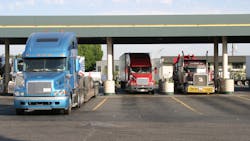I am very excited that we have been able to resume reporting on findings on NACFE’s ninth Annual Fleet Fuel Study. This was one of the very first reports we published and serves as the basis for much of our work studying and reporting on technologies and practices that enhance freight efficiency.
We took a three-year break because of the extraordinary circumstances caused by the pandemic, but the new study does contain data from 2019, 2020, and 2021. The report asks fleets about their adoption of 86 technologies and practices.
What we learned in this study is that fleets are increasing their rate of adoption of these technologies and as a result they are seeing improved fuel economy. The average fleet-wide fuel economy of the trucks in this study was 7.23 MPG in 2021. One thing we found very interesting is that the national average of the 1.7 million tractors in over-the-road use jumped to 6.24 MPG based on IFTA data.
See also: Study: MPG improves as fleets adopt diesel-saving technologies
One not totally surprising finding was that fleet-wide efficiency stalled from 2018 to 2021. We think this is because fleets are driving trucks faster, keeping trucks longer, GHG regs are making base engines and trucks more efficient right off the production line and idling times were up for those three years as drivers took extra precautions to limit their exposure to COVID-19 so spent more time in their trucks.
Sustainability also has taken a more prominent place in fleets’ decision making and improving the number of miles a truck can go on a gallon of diesel effectively reduces the amount of fuel a fleet needs. It is important to remember that getting more miles from a gallon of diesel is a step in a fleet’s decarbonization journey.
At NACFE, we are all about improving freight efficiency and would like to see all fleets increase their adoption of the studied technologies. However, we know that not every technology is right for every fleet, but there are steps fleets can take today to improve.
Our recommendation for fleets wanting to improve the fright efficiency is to collect fuel consumption information on a vehicle-by-vehicle basis and then set MPG improvement goals. We’ve added an interactive benchmarking tool that allows fleets to identify technologies to test in their operation. We are confident this will help fleets make decisions about which efficiency technologies are right for them easier to make.
Once fleets have the information on the best technologies for them, they need to budget for adding those technologies on an ongoing basis and continue to monitor their freight efficiency.
Improving freight efficiency should be an ongoing process and we think the Annual Fleet Fuel Study—which we will update next year—is a good place for fleets to start.
Michael Roeth has worked in the commercial vehicle industry for nearly 30 years, most recently as executive director of the North American Council for Freight Efficiency (NACFE). He serves on the second National Academy of Sciences Committee on Technologies and Approaches for Reducing the Fuel Consumption of Medium and Heavy-Duty Vehicles and has held various positions in engineering, quality, sales, and plant management with Navistar and Behr/Cummins.
About the Author

Michael Roeth
Executive Director
Michael Roeth is the executive director of the North American Council for Freight Efficiency. He serves on the second National Academy of Sciences Committee on Technologies and Approaches for Reducing the Fuel Consumption of Medium and Heavy-Duty Vehicles and has held various positions with Navistar and Behr/Cummins.
